Available 24/7 via chat
Available 24/7 via chat
Airports are bustling environments with high foot traffic and a variety of contaminants in the air. Ensuring clean air is essential not only for passenger comfort and health but also for the efficiency of airport operations. Air filtration systems play a key role in maintaining optimal air quality, helping to create a welcoming environment for passengers, as well as a safe and comfortable atmosphere for airport employees. Clean-Link’s air filtration solutions are designed to meet the unique demands of airports, where air quality and cleanliness are critical.
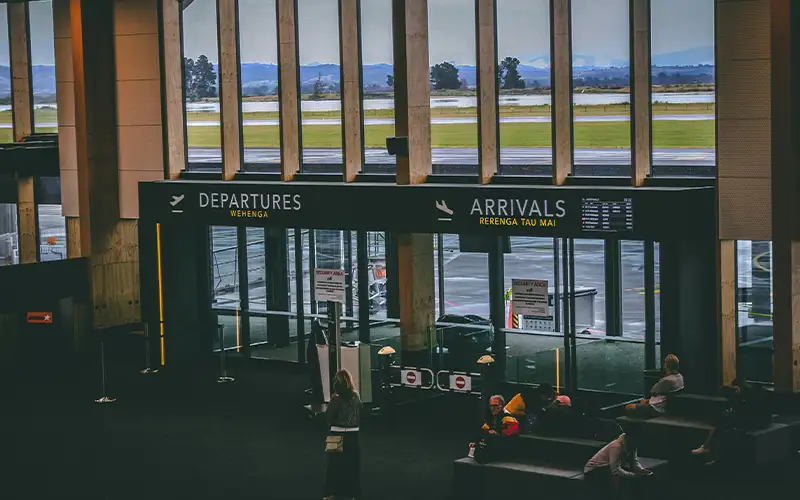
Airports experience significant foot traffic, with thousands of passengers passing through terminals, security checkpoints, and other areas each day. This constant movement increases the accumulation of dust, bacteria, viruses, and other airborne contaminants.
With the large number of people in confined spaces, these contaminants can quickly degrade air quality, making effective air filtration essential to minimize health risks and ensure a pleasant experience for travelers and airport employees.
Airports are home to various sources of odors and pollutants, from food courts to restrooms, and even the air travel itself. Volatile organic compounds (VOCs), smoke, and food odors are common pollutants that can create an uncomfortable environment.
Additionally, allergens like pollen and dust mites can trigger reactions in passengers, especially in crowded areas like waiting lounges and terminals. Proper air filtration using activated carbon filters and HEPA filters is essential to remove odors and control pollutants, ensuring a fresh and clean atmosphere throughout the airport.
Airports need to maintain a high standard of air quality in both public spaces and back-of-house areas. Terminals, waiting areas, and check-in counters are places where passengers spend long periods, and ensuring that the air is fresh and comfortable is key to their overall satisfaction.
Similarly, areas like baggage claim zones, security checks, and offices require clean air to create a comfortable working environment for employees. Effective air filtration systems help control temperature, humidity, and airborne particles, improving the overall experience for both travelers and staff.
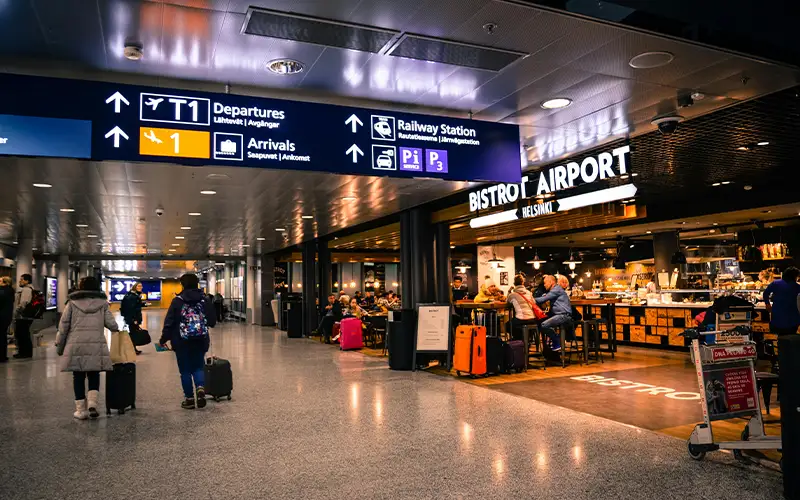
Airports are dynamic, high-traffic environments where air quality plays a critical role in the comfort and health of passengers and staff.
Efficient air filtration systems are essential for maintaining a clean and safe indoor environment, particularly in areas with large volumes of people and complex air circulation systems. Here’s how air filtration contributes to improving air quality in airports:
Airports experience a high concentration of airborne contaminants due to the movement of people, luggage, food preparation, and other activities.
Air filtration systems work by capturing dust, allergens, bacteria, viruses, and other harmful particles that can negatively affect indoor air quality.
By using advanced filters like HEPA filters, airports can significantly reduce the presence of airborne pollutants, ensuring passengers breathe cleaner air as they move through terminals, lounges, and other high-traffic areas.
Airports are constantly bustling with travelers, making it essential to maintain clean air for both passengers and staff. High traffic leads to an increase in airborne contaminants such as pollen, dust, and pet dander, which can trigger allergies or discomfort. Effective air filtration helps to remove these particles, promoting passenger comfort and staff well-being.
In addition to ensuring a more pleasant atmosphere, it also supports the overall efficiency of airport operations by preventing contaminants from settling on sensitive equipment, which can lead to maintenance issues.
Air filtration is especially important in sensitive areas of the airport, such as security checkpoints, lounges, and baggage claim areas, where large crowds gather and where air quality can quickly degrade. Security checkpoints often have long queues, leading to increased exposure to pollutants and pathogens.
Clean, filtered air helps reduce the spread of airborne diseases and ensures a more comfortable experience for passengers. Similarly, in lounges and baggage claim areas, high-quality air filtration helps maintain freshness and prevent the buildup of odors, creating a pleasant environment for both passengers and staff.
Effective filtration ensures that these high-traffic areas remain clean and comfortable, improving the overall airport experience.
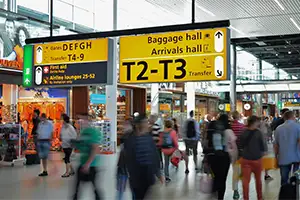
Filters in passenger terminals maintain clean air in waiting areas, check-in counters, and gate lounges, improving comfort for travelers.
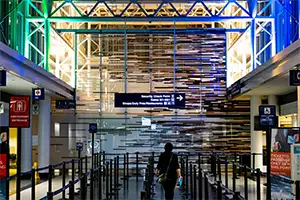
With high traffic volumes, air filtration systems help maintain air quality in crowded areas like security checkpoints, preventing the buildup of dust and pollutants.

Our filtration systems control odors and humidity levels in these high-use areas, ensuring a fresh environment for passengers.
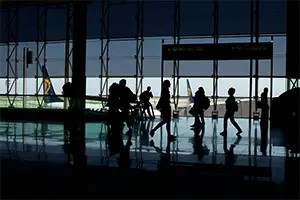
High-traffic baggage areas benefit from air filtration that removes airborne contaminants and odors, creating a cleaner environment for passengers and staff.
Airports are often busy, crowded places, and clean, fresh air plays a crucial role in enhancing passenger comfort. With effective air filtration, airports can ensure that passengers enjoy a more pleasant experience, whether they are waiting for flights, passing through security, or relaxing in lounges.
By reducing airborne contaminants such as dust, allergens, and pollutants, passengers can breathe easier, contributing to a more enjoyable and stress-free time within the airport.
One of the most important benefits of air filtration in airports is the significant impact on health and safety. With large numbers of people moving through the airport, the potential for airborne transmission of bacteria, viruses, and other pathogens is high.
Air filtration systems equipped with HEPA filters help capture these harmful particles, reducing the risk of illness and improving the overall health environment for both passengers and employees. By removing allergens, bacteria, and airborne viruses, air filtration also helps reduce the likelihood of allergy flare-ups and respiratory problems, ensuring a safer space for everyone.
Airports are filled with various sources of odors, including food courts, restrooms, and even the scent of jet fuel. Odor control is a crucial aspect of maintaining a clean and inviting airport environment.
Activated carbon filters are highly effective at absorbing and neutralizing odors, preventing unpleasant smells from lingering and spreading throughout high-traffic areas. Whether it’s the strong smells from food preparation areas or the more sensitive odors in restrooms, effective air filtration ensures that the air remains fresh and comfortable, leaving passengers with a positive first impression.
Efficient air filtration systems can also contribute to a more energy-efficient operation. By optimizing airflow and maintaining the performance of HVAC systems, air filtration helps reduce the energy consumption of heating, cooling, and ventilation processes.
Filters that capture airborne particles before they settle in HVAC systems reduce the amount of maintenance required, extending the life of the equipment and lowering operational costs. In turn, this boosts the overall energy efficiency of the airport, reducing both costs and environmental impact while maintaining optimal air quality across the facility.
Selecting the right air filters for your facilities can be a challenging task, given the variety of filter types and specifications available. If you're unsure about which filter best suits your needs, our team of experts is here to help.
With years of experience in air filtration solutions, we can guide you in choosing the ideal filter to optimize your application's performance and ensure superior air quality.
Contact us today for personalized advice and assistance tailored to your specific requirements.



$150.00 away from free shipping!
